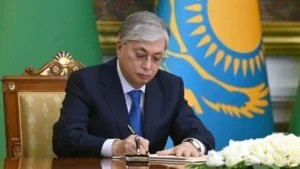France Approves Return of Historic “Talking Drum” to Ivory Coast

Paris, The Gulf Observer: The French National Assembly on Monday approved the return of a significant cultural artefact—a ceremonial “talking drum”—to Ivory Coast, marking a major step in France’s broader efforts to repatriate looted colonial heritage.
Known as the Djidji Ayokwe, the drum was taken by colonial forces from the Ebrie tribe in 1916. Measuring over three metres (10 feet) in length and weighing approximately 430 kilograms (950 pounds), the drum served as a traditional communication tool used to transmit messages between communities, including warnings against forced recruitment campaigns during the colonial period.
Following approval by the upper house of Parliament in April, the National Assembly’s vote now authorizes the removal of the drum from France’s national museum collections, paving the way for its official restitution. The decision comes in response to a formal 2018 request by Ivorian authorities for the return of 148 cultural objects taken during the colonial era, including the Djidji Ayokwe.
French President Emmanuel Macron had pledged in 2021 to return the drum to Ivory Coast as part of his broader commitment to redefining France’s post-colonial relations with Africa. The move was hailed by Clavaire Aguego Mobio, leader of the Ebrie people, who described the promise as “a highly historic move.” Speaking to AFP at the time, Mobio likened the drum to a modern communication device, saying, “It was our loudspeaker, our Facebook,” and noted that his people had nearly abandoned hope of its return.
Since taking office in 2017, President Macron has taken a more proactive stance than his predecessors in acknowledging historical injustices committed by France in Africa. The restitution of looted African artefacts has been a cornerstone of his vision for a “new relationship” with the continent—one grounded in transparency, respect, and cultural reconciliation.
The return of the Djidji Ayokwe follows earlier restitutions to Benin and Senegal and is seen as a symbolic yet concrete gesture towards healing historical wounds and restoring cultural dignity to former colonies.


